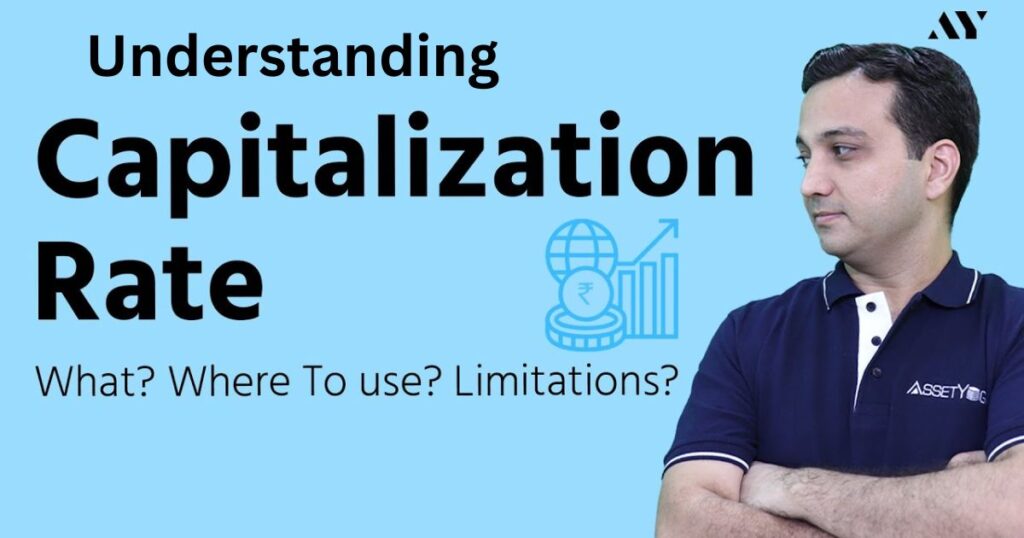In real estate investing, the capitalization rate (cap rate) is a critical metric that measures the potential rate of return on an income-producing property. It represents the ratio of the property’s net operating income to its current market value or purchase price.
A higher cap rate typically indicates a higher potential return but may also suggest higher risk. Conversely, a lower cap rate implies a lower return but potentially lower risk. Cap rates vary based on factors like location, property type, market conditions, and risk factors.
Cap rate is very important for investors to evaluate the return and risk of real estate investment opportunities. It allows comparing properties, estimating values through the capitalization approach and assessing whether expected returns are consistent with investment goals and risk tolerance.
Is Real Estate Capitalized?
Before delving into the concept of capitalization rate (cap rate), it’s essential to address a fundamental question: Is real estate capitalized? The answer depends on the context in which the term is used. As a general rule, you should capitalize “Real Estate” when it is used as a noun referring to the industry or field as a whole. For example:
- She has been working in the Real Estate industry for over a decade.
- The company specializes in Real Estate investments.
When real estate is used as a general descriptor or an adjective, it should not be capitalized. For instance:
- She invested in several real estate properties across the city.
- The company employs numerous real estate agents.
Maintaining consistent capitalization is crucial for clear and professional communication within the real estate industry. Throughout this article, we will follow the appropriate capitalization conventions to ensure clarity and adherence to established guidelines.
Understanding Capitalization Rate (Cap Rate)

The capitalization rate, commonly referred to as the cap rate, is a fundamental metric used in real estate investing to evaluate the potential return on investment (ROI) for income-producing properties. It is a crucial tool for investors, developers, and real estate professionals to assess the profitability and risk associated with a particular property.
The cap rate is expressed as a percentage and represents the ratio of a property’s net operating income (NOI) to its current market value or purchase price. In simpler terms, it measures the potential annual return an investor can expect from the property based on its current income and value.
What is the Cap Rate Formula?
The cap rate formula is relatively straightforward:
Cap Rate = Net Operating Income (NOI) / Current Market Value (or Purchase Price)
To calculate the cap rate, you need to determine the property’s net operating income and its current market value or purchase price.
Net Operating Income (NOI) is the annual income generated by the property after deducting operating expenses, such as property taxes, insurance, maintenance, and utilities. It does not include mortgage payments or other financing costs.
Current Market Value (or Purchase Price) is the estimated value of the property based on recent comparable sales or an appraisal. If you are considering purchasing a property, you would use the proposed purchase price as the value in the cap rate calculation.
For example, let’s say a commercial property generates $100,000 in net operating income, and its current market value is $1,500,000. The cap rate would be calculated as follows:
Cap Rate = $100,000 (NOI) / $1,500,000 (Current Market Value) = 0.0667 or 6.67%
In this scenario, the cap rate of 6.67% indicates that the property is expected to generate a 6.67% annual return on the investment based on its current income and value.
Also Read: Money6x Real Estate : Exploring Money6x’s Role In Real Estate Investment 2024
Capitalization Approach and Determining Property Value
The cap rate can also be used to estimate the property’s value, known as the capitalization approach. This approach is particularly useful when valuing income-producing properties, such as apartment complexes, office buildings, or retail centers.
The formula for determining property value using the capitalization approach is:
Property Value = Net Operating Income (NOI) / Capitalization Rate
Using the previous example, if the property’s net operating income is $100,000 and the targeted cap rate is 6.67%, the estimated property value would be:
Property Value = $100,000 (NOI) / 0.0667 (Cap Rate) = $1,500,000
This approach allows investors and real estate professionals to estimate the potential value of a property based on its income-generating capability and the expected rate of return in the market.
Factors Influencing Cap Rates
Cap rates can vary significantly depending on various factors, including:
- Location: Properties in prime locations with strong demand tend to have lower cap rates, as they are perceived as lower-risk investments.
- Property Type: Different property types, such as residential, commercial, or industrial, may have varying cap rate expectations based on their risk profiles and income stability.
- Market Conditions: During periods of high demand and low supply, cap rates tend to be lower, as investors are willing to accept lower returns due to the perceived stability of the investment.
- Risk Factors: Properties with higher risk factors, such as vacancy rates, tenant quality, or deferred maintenance, typically command higher cap rates to compensate for the increased risk.
- Interest Rates: Changes in interest rates can impact cap rates, as they affect the cost of financing and the overall attractiveness of real estate investments compared to other investment opportunities.
It’s important to note that cap rates are not static and can fluctuate over time based on market conditions, economic factors, and investor sentiment.
Real Estate Capitalization in Construction Projects

In the context of construction projects, capitalization refers to the practice of treating certain costs as capital expenditures rather than operating expenses. This approach is commonly used for real estate development and renovation projects, where specific costs are added to the property’s value or capitalized.
Capitalized costs in real estate construction projects may include:
- Land Acquisition: The cost of purchasing the land or property on which the construction will take place.
- Construction Costs: Expenses related to the actual construction or renovation work, such as labor, materials, and contractor fees.
- Financing Costs: Interest expenses incurred during the construction period, which can be capitalized as part of the project’s overall cost.
- Architectural and Engineering Fees: Costs associated with the design, planning, and engineering services required for the project.
- Permits and Approvals: Fees paid to obtain necessary permits and approvals from local authorities for the construction.
By capitalizing these costs, developers and investors can include them in the property’s overall value, which can then be depreciated over time or recovered through future sales or income generation.
Real Estate Capitalization and Financing
Capitalization also plays a crucial role in real estate financing. When obtaining a loan or mortgage for a real estate investment, lenders will consider the property’s capitalization rate as part of their underwriting process.
A higher cap rate generally indicates a lower risk for the lender, as the property is generating a higher return relative to its value. Conversely, a lower cap rate may be perceived as riskier, as the property’s income may not be sufficient to cover the mortgage payments and other expenses.
Lenders often have specific cap rate requirements or guidelines that borrowers must meet to qualify for financing. These guidelines can vary based on factors such as the property type, location, and the borrower’s creditworthiness.
Real Estate Capitalization and Taxes
In the realm of real estate taxation, capitalization has significant implications for both investors and real estate professionals. The Internal Revenue Service (IRS) has specific guidelines and regulations regarding the capitalization of certain expenses related to real estate investments.
For example, costs associated with acquiring, constructing, or improving a property must generally be capitalized and depreciated over the useful life of the asset. This includes expenses such as purchase price, closing costs, construction costs, and renovation expenses.
On the other hand, expenses related to the ongoing operation and maintenance of a property, such as repairs, utilities, and property management fees, are typically treated as deductible operating expenses in the year they are incurred.
Proper capitalization and adherence to IRS guidelines are crucial for real estate investors and professionals to ensure compliance with tax regulations and maximize potential deductions and depreciation benefits.
Also Read: The 15 Best Neighborhoods in Palm Springs: A Comprehensive Guide
The Role of Real Estate Professionals

Given the complexity and nuances of real estate capitalization, it is often advisable for investors, developers, and property owners to seek guidance from experienced real estate professionals. These professionals possess a deep understanding of capitalization principles, market dynamics, and regulatory requirements, enabling them to provide valuable insights and recommendations.
- Real Estate Agents and Brokers: Real estate agents and brokers can provide valuable market insights, assist in property valuations, and guide clients through the buying and selling process while considering capitalization factors.
- Real Estate Appraisers: Appraisers are skilled in determining the market value of properties, taking into account factors such as capitalization rates, income potential, and market trends.
- Real Estate Attorneys: Real estate attorneys can provide legal guidance on various aspects of real estate capitalization, including contract negotiations, due diligence, and ensuring compliance with relevant laws and regulations.
- Real Estate Accountants and Tax Professionals: These professionals can advise on the tax implications of real estate capitalization, ensuring proper treatment of expenses, deductions, and depreciation according to IRS guidelines.
- Real Estate Developers and Contractors: Developers and contractors are well-versed in the capitalization of construction costs, land acquisition, and other project-related expenses, enabling them to accurately estimate project costs and potential returns.
By collaborating with these real estate professionals, investors and property owners can make informed decisions, mitigate risks, and maximize the potential returns on their real estate investments.
Frequently Asked Question
What Is A Cap Rate?
A cap rate (capitalization rate) is a ratio used to estimate the potential rate of return on an income-producing property. It is calculated as Net Operating Income / Current Market Value.
Why Is The Cap Rate Important For Real Estate Investors?
The cap rate provides a standardized way to evaluate and compare the profitability and risk of different investment properties. It helps investors determine if the expected return aligns with their goals and risk tolerance.
How Does Location Affect The Cap Rate?
Properties in prime locations with high demand tend to have lower cap rates, as they are perceived as lower-risk investments. Properties in less desirable areas often have higher cap rates to compensate for the increased risk.
What Factors Influence Cap Rates?
Cap rates are influenced by location, property type, market conditions, risk factors (vacancy rates, tenant quality, etc.), and interest rates. These factors can cause cap rates to fluctuate over time based on market dynamics.
Can The Cap Rate Be Used To Estimate Property Value?
Yes, the capitalization approach uses the cap rate to estimate a property’s value based on its income potential. Property Value = Net Operating Income / Capitalization Rate.
Final Thoughts
Understanding the concept of capitalization rate (cap rate) is crucial for anyone involved in real estate investing or managing income-producing properties. The cap rate serves as a valuable tool for evaluating the potential return on investment, assessing risk, and determining property values.
However, it’s important to remember that the cap rate should not be viewed in isolation. It is one of many factors that contribute to a well-informed investment decision. Other considerations, such as market trends, property condition, location, and potential for appreciation or depreciation, should also be carefully evaluated.
When analyzing cap rates, it’s essential to remain objective and rely on accurate data and market insights. Real estate professionals, such as appraisers, brokers, and analysts, can provide valuable guidance and ensure that cap rate calculations are based on reliable information and industry best practices.











